He passed away yesterday at the age of 90. Sad news. He will always be the one and true James Bond to me. On the other hand, I never quite forgave him for this...
Musings, observations, and written works from the publisher of Eckhartz Press, the media critic for the Illinois Entertainer, co-host of Minutia Men, Minutia Men Celebrity Interview and Free Kicks, and the author of "The Loop Files", "Back in the D.D.R", "EveryCubEver", "The Living Wills", "$everance," "Father Knows Nothing," "The Radio Producer's Handbook," "Records Truly Is My Middle Name", and "Gruen Weiss Vor".
Saturday, October 31, 2020
Tough Times for Fake Melania
Another Melania impersonator, Lauren LoGiudice, says she thought she would finally get hired after the #FakeMelania conspiracy ... but it hasn't happened.

Lauren says her Melania impersonation incorporates comedy, but notices no one thinks a Melania bit is funny anymore. She also thinks the secret recordings hurt her job prospects, because some people feel anger toward the First Lady.
Friday, October 30, 2020
Free Kicks
On this week's episode we analyze the teams near the top of the table to see if they are real contenders or not. https://t.co/nX9Smk3zOH @fkadamandrick #PremierLeague
— Rick Kaempfer (@RickKaempfer) October 30, 2020
Life Behind the Camera
On this day in 2013, Eckhartz Press released a great book about the Chicago television news world, LIfe Behind the Camera. It was written by longtime cameraman Chuck Quinzio, and people in the business immediately recognized the truth and wisdom of his words.
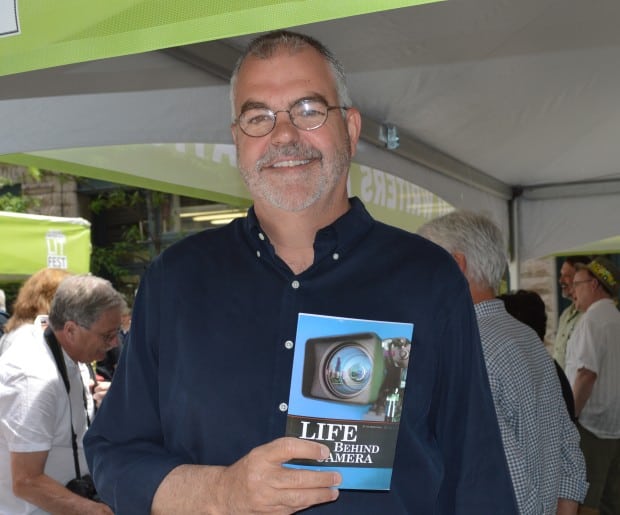
“This is a must read for anyone interested in learning about the world of TV journalism — as seen through the eyes (and lens!) of Chuck Quinzio — one of the best in the business. Reading Chuck’s many stories — well-spiced with his terrific dry wit — is a great way to discover how television photo-journalism has evolved from the 1980s to the present day. That said, Chuck’s often-hilarious tales about the foibles of the true characters he’s encountered these past three decades makes for wonderful reading.”
Bill Zwecker, Fox-32 News and the Chicago Sun Times
“Anyone in broadcasting will be fascinated by Chuck Quinzio’s TV and radio adventures. I thought I heard Chuck’s best stories during my time working with him in the TV news business, but he saved the best for this book! His writing talent makes it a great read for everybody.”
Bob Sirott, WGN Radio
Finished it in one sitting while on a flight from San Francisco to Chicago earlier this month! The writing is crisp and I enjoyed every chapter, many of them quite funny.
Nancy Loo, WGN-TV
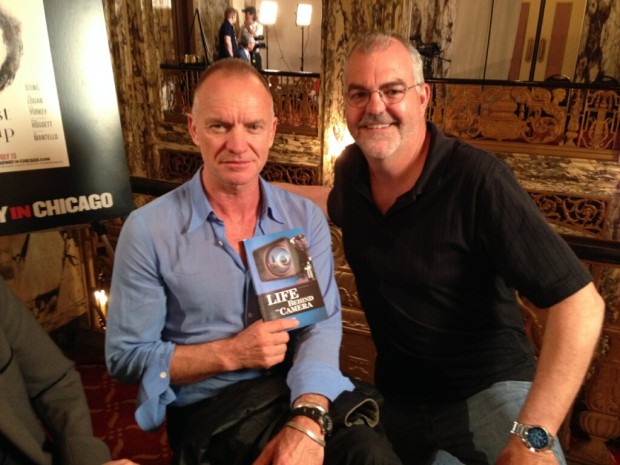
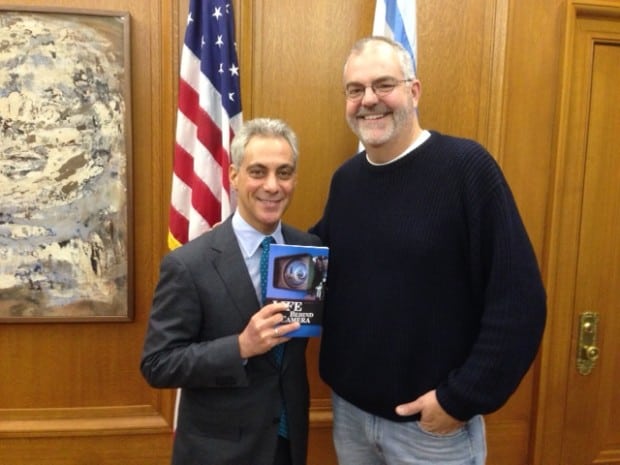
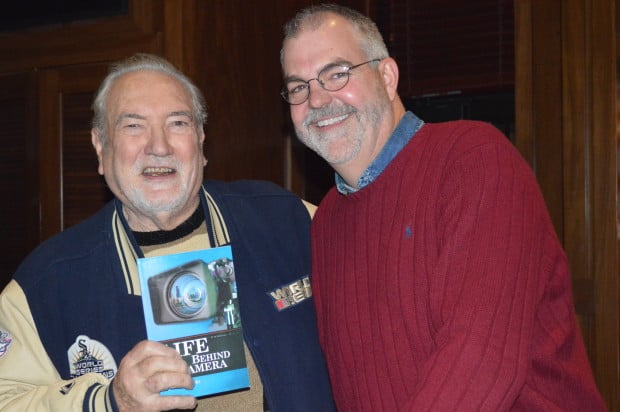
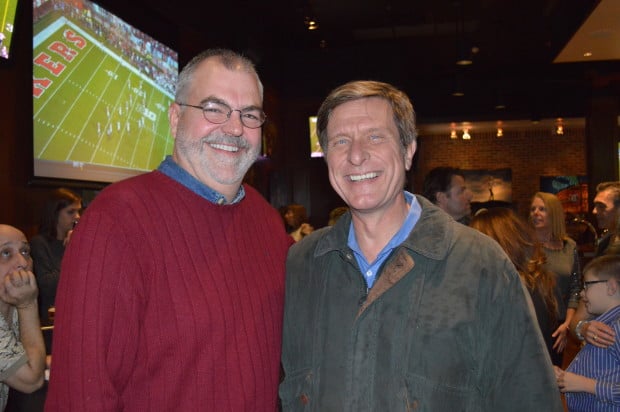
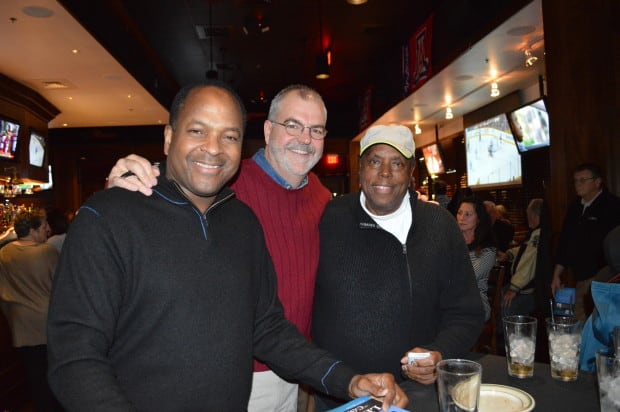
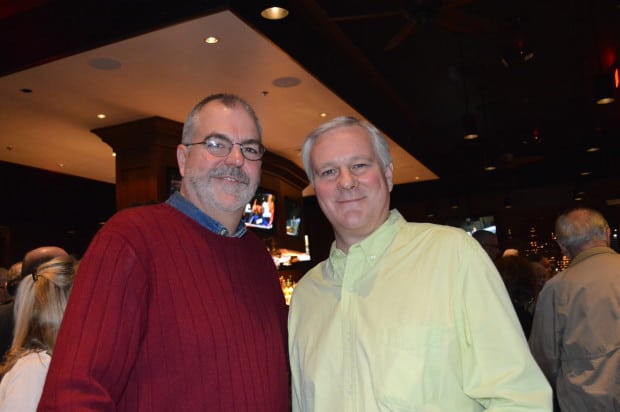

Thursday, October 29, 2020
Q&A with William Mansfield
EP: This is your second book for Eckhartz Press. Your first book "The Scar Dance" was a finalist for CWA Book of the Year in the fiction category. This one is non-fiction. It's a memoir. Talk about what inspired you to write it.
Denny Laine
Former Moody Blues and Wings guitarist Denny Laine is celebrating a birthday today. Back in 2017, Eckhartz Press publishers Rick Kaempfer and David Stern filled in for Bob Sirott on WLS Radio in Chicago. Among their guests that day, Denny Laine. He was accompanied by his old friend Neil Innes (from Monty Python) and Mark Hudson (from the Hudson Brothers).
Wednesday, October 28, 2020
Minutia Men Celebrity Interview--Svengoolie
#MinutiaMenCelebrityInterview EP43: Rick and Dave sit down with @Svengoolie's Rich Koz https://t.co/MqcdiUTZnM
— Radio Misfits (@RadiosMisfits) October 28, 2020
Dennis Franz
Today is Dennis Franz’s birthday, and as a birthday tribute, we’re providing a free excerpt about him from the Eckhartz Press book Cubsessions. Authors Randy Richardson and Becky Sarwate-Maxwell interviewed an A-list of celebrities about their love of the Cubs. This is the chapter about Dennis….
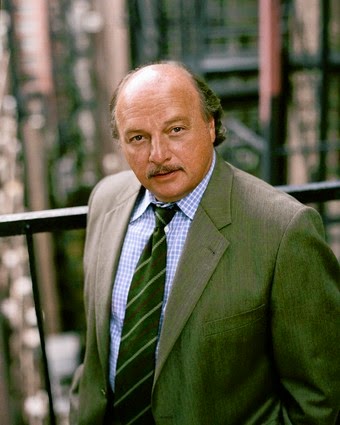
Growing up in Maywood, west of Chicago, in the 1950s, Dennis Franz’s sport was baseball and his team was the Cubs. Not surprisingly, his favorite player was No. 14, Ernie Banks (aka “Mr. Cub”).
“He was my hero,” Franz said in a phone interview. “I grew up trying to bat like him, wiggling my fingers like him…”
Two decades later, Franz was a budding actor in Chicago perfecting his craft in the Organic Theater Company, a repertory theater that had set up shop in the Uptown Center Hull House on Beacon Street. The new company, which also included Joe Mantegna and Meshach Taylor, gained some notoriety in 1974, when it presented the world premiere of Sexual Perversity in Chicago by David Mamet.
Two years later, Mantegna planted the seed for a play about Cub fans. “[Mantegna] would walk by [Wrigley Field] every day and he’d see all these fans spilling out of the stadium,” Franz said, and he thought, ‘There’s got to be some way to bring them into our theater.’”
[Mantegna’s] the one that brought the idea and got us thinking in that direction,” Franz said. “Collectively, we all started talking about it and we decided we’d start going to some of the games to try to find some interesting people. So that was our homework. When we weren’t performing, we’d go to Wrigley and we’d watch the games and look for interesting characters. We came to see this little group in the bleachers that were always there, and they were interesting and fun people and bets were flying around. There was just a lot going on.”
Those real-life characters became the inspiration for Bleacher Bums, which debuted in 1977 under the direction of Stuart Gordon. “We decided it was going to be one game that was representative of the heartbreak that was experienced by the Cubs over the years on a regular basis,” Franz said. “How the hopes get built up and dreams are crashed and still you remain a loyal Cubs fan.”
Bleacher Bums and its themes of hope, futility and – most of all – die-hard loyalty, struck a chord and toured across the country with changing casts that included Dennis Farina, Gary Sandy and George Wendt. A 1979 performance of the play was taped for PBS television, and in 2002, a made-for-TV movie adaptation was produced.
As it turned out, Bums was Franz’s final show with the Organic Theater Company before he hitched up a U-Haul and headed for Hollywood. “I think we all were kind of surprised by the popularity of it,” Franz said. “Quite honestly, I didn’t think it was our best work. But it turned out to be one of the most beloved works that we had done over that five-year period and for those of us who worked on the original production, it certainly has the fondest place in all of our hearts. We just wanted to fill the seats of the theater and it turned into this thing that I think everyone of us is grateful for.”
In Hollywood, Franz gained fame for his tough-but-lovable cop roles, first as Lt. Norman Buntz on Hill Street Blues and later as Detective Andy Sipowicz on NYPD Blue, for which he earned four Emmy Awards for Outstanding Lead Actor in a Drama Series.
Before he landed those star-making roles, Franz played pitching coach Angelo Carbone in Bay City Blues, a short-lived comedy-drama series about a minor league baseball team, the Bay City Bluebirds. Despite an impressive cast that also included then-relative unknowns Michael Nouri, Sharon Stone and Ken Olin, NBC aired only four of the eight episodes that were produced before cancelling the show for low ratings.
But that short-lived series made a lasting impact on Franz as there was also a baseball player extra on the series by the name of Joey Banks, who Franz came to learn is the son of Cubs’ great Ernie Banks, Franz’s boyhood hero. Through that chance connection Franz got to meet the Hall of Fame player he idolized as a kid.
“I got a nice personally-signed autograph from Ernie,” Franz said, “and then I got to meet him several times. Throughout the years, we became sort of semi-friends. He was baseball for me.”
Franz readily admits that for several years, he had not kept up closely with the Cubs. Then in 1998, he was invited to sing “Take Me Out to the Ballgame” at Wrigley Field during the seventh-inning stretch. Into the booth, he brought his three nephews, then between eight and 12 years old, to sing along with him. “That was an unforgettable experience and one that I will forever cherish,” he said. “The opportunity that the Cubs organization gave me – and to bring my nephews with me – that was something that meant the world to them, because I come from a very, very, very Cubs family. They were introduced to the love of Cubs at birth. Their father is a die-hard Cubs fan as the rest of the family is, too. So that was the highlight of their life for them at that time.”
The youngest of those three nephews, Cody Sharko, now works for the Cubs organization in its corporate partnerships division. “To know that this little squirt, who came into the box with me and sang ‘Take Me Out to the Ballgame’ is now working for the love of his life, the Chicago Cubs, and he was given this beautiful commemorative ring – it’s just a story that goes full-circle and it’s so wonderful to see…Through him I’m living vicariously.”
For Franz, the Cubs’ winning the World Series “was a validation of so many years of dreaming a dream and truly in your heart accepting the fact that that dream may never come true.”
“It is something that I didn’t expect to experience in my lifetime,” Franz said. “I thought there’s no way that it was going to happen. It was something that I had loved all my life, and even though I didn’t always follow them over the years, it wasn’t that I had lost that love for them. It’s just that life is long and there are many directions and many roads that it takes you. When you’re young and you’re playing baseball, that’s the center of your world. You become older and all of that changes. But the love and the passion is still inside of you.
“Over all the years, I don’t care where I am or who I’m with, if you asked me who do you like, I would always say ‘I’m a Cubs fan. I always will be.’ So when the dream came true, it was a validation. It was pretty wonderful.”
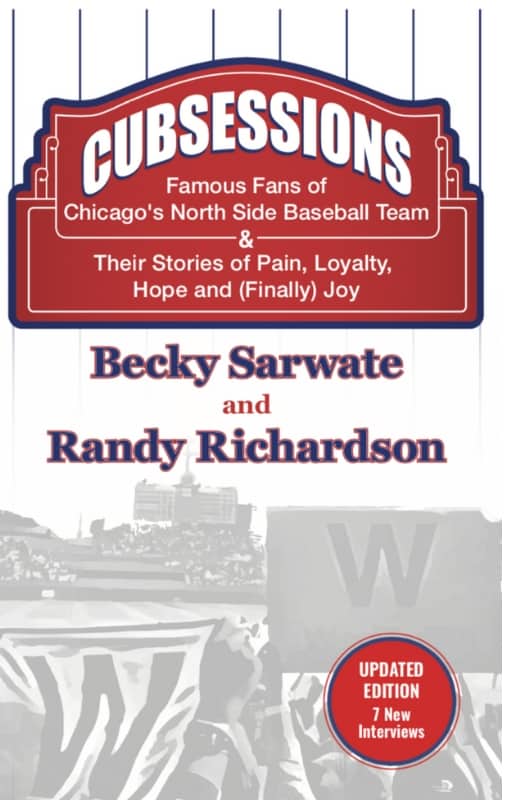
Eckhartz Press Author Mike Gentile
Eckhartz Press author Mike Gentile killed it on WGN Radio the other night. Thanks so much to John Landecker for having him on the show. You can listen to it here
Tuesday, October 27, 2020
I Will Never Get Sick of These
Because most everything sucks right now please enjoy this baby laughing with daddy.
— Rex Chapman🏇🏼 (@RexChapman) October 26, 2020
Needed it today...pic.twitter.com/0L2WWWix0x
William Mansfield
Exactly four years ago today, William Mansfield’s first novel was released by Eckhartz Press. It was called The Scar Dance, and was a finalist for the CWA Book of the Year in the Indy Fiction category.
We did a Q&A with William when that book came out, and you can read it here.
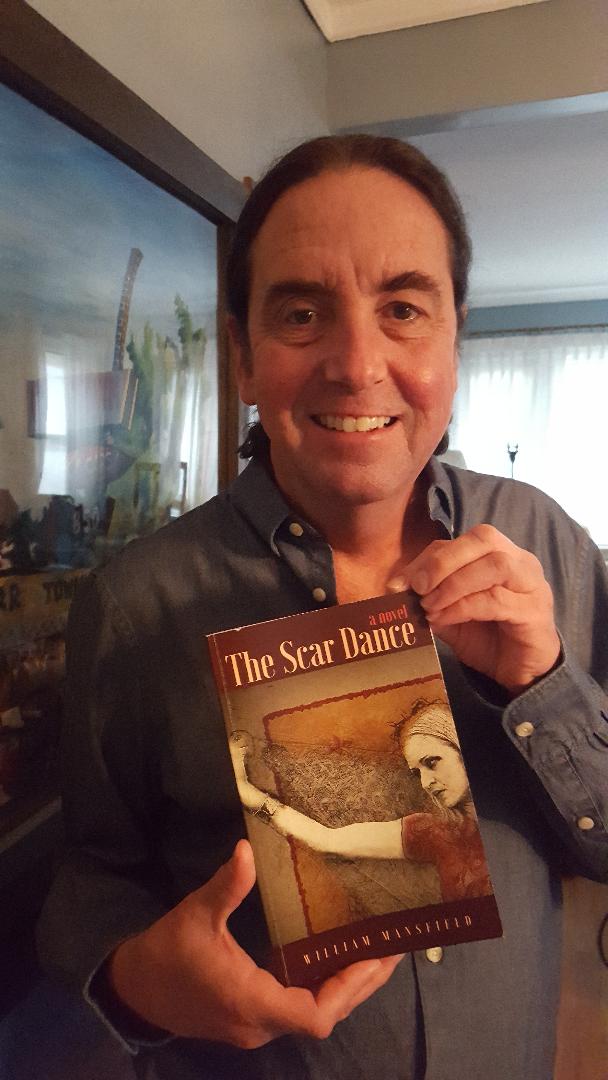
Exactly four years later William has returned with his second book for Eckhartz Press. It comes out tomorrow, and it’s called The Most Beautiful Place in Hell. This time it’s not fiction. It’s a memoir about being bullied as a child. Eckhartz Press is happy to release it in October, which is officially anti-bullying month.
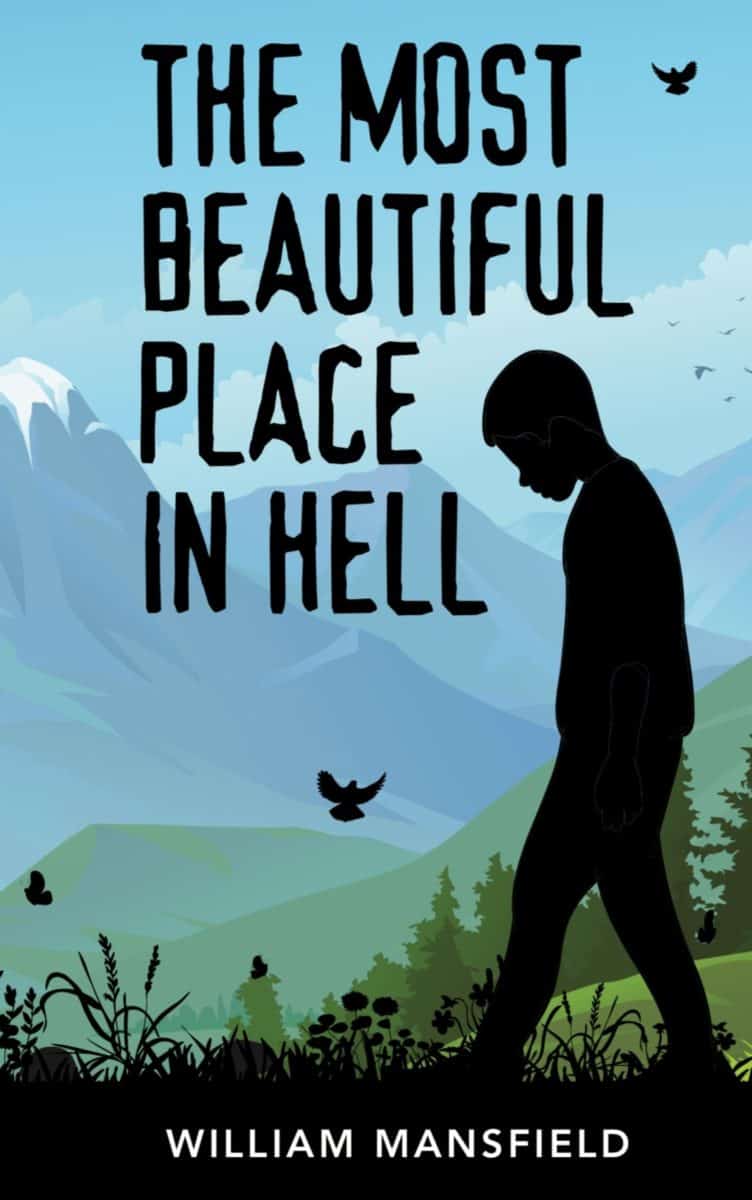
Congrats to William on his great accomplishment!
Taking it seriously...off the air
How irritating is this? Fox News, the president's mouthpiece, which has several prime time hosts openly insinuating this virus is no big deal ON the air, treats it VERY differently OFF the air. From Deadline Hollywood...
Fox News Media CEO Suzanne Scott and president Jay Wallace said in a memo to employees Monday that they will be further reducing their workforce in their buildings and operating virtually “wherever possible” throughout the week after confirming a “few positive cases” of coronavirus at the company.
The memo follows a New York Times report on Sunday that Wallace and several of its anchors, including Bret Baier and Martha MacCallum, are being advised to quarantine after possible exposure to a person who later tested positive for COVID-19. They had been on a flight with that person returning from Nashville after coverage of the final presidential debate last week.
Chicago Radio Ratings
From Robert Feder's column this morning. For the full daypart breakdowns, click here. These are the overall ratings...
1. WVAZ 102.7-FM R&B, 8.4 (8.6)
2. WBBM 780-AM/WCFS 105.9-FM all news, 6.9 (6.4)
3. WDRV 97.1-FM classic rock, 5.1 (4.5)
4. WTMX 101.9-FM hot adult contemporary, 4.6 (4.2)
5. WLIT 93.9-FM adult contemporary, 4.3 (4.7)
6. WOJO 105.1-FM Mexican regional, 4.2 (3.8)
7. WLS 94.7-FM classic hits, 4.0 (4.4)
8. WXRT 93.1-FM adult album alternative, 3.9 (4.7)
9. WBEZ 91.5-FM public radio news talk, 3.8 (3.2)
10. WSCR 670-AM sports talk, 3.2 (2.5)
11. WGN 720-AM news talk, 3.0 (3.1)
12. WRME 87.7-FM soft rock oldies, 2.9 (2.8)
13. WLEY 107.9-FM Mexican regional, 2.7 (2.2)
14. WKSC 103.5-FM Top 40, 2.6 (3.1)
15. WPPN 106.7-FM Spanish adult contemporary, 2.5 (2.6)
16. (tie) WBMX 104.3-FM classic hip hop, 2.4 (2.8); WSHE 100.3-FM adult contemporary, 2.4 (2.8)
18. WUSN 99.5-FM country, 2.3 (2.3)
19. (tie) WCHI 95.5-FM rock, 2.2 (1.8); WLS 890-AM news talk, 2.2 (2.1)
21. (tie) WBBM 96.3-FM Top 40, 2.0 (2.7); WGCI 107.5-FM hip-hop, 2.0 (2.5)
23. WKQX 101.1-FM alternative rock, 1.9 (2.2)
24. WCPT 820-AM progressive talk 1.6 (1.3)
25. WPWX 92.3-FM hip-hop, 1.4 (1.5)
26. (tie) WFMT 98.7-FM classical 0.9 (0.9); WVIV 93.5-FM Spanish contemporary, 0.9 (1.2)
28. WMVP 1000-AM sports talk, 0.8 (0.9)
29. WCKL 97.9-FM contemporary Christian music, 0.7 (0.7)
30. WSRB 106.3-FM R&B, 0.6 (0.7)
Monday, October 26, 2020
RIP Bob Murray
15 Years Ago
From today's Studio Walls feature on the Eckhartz Press blog...
It doesn’t seem possible it was 15 years ago, but on this day in 2005, the Chicago White Sox won the World Series for the first time since 1917.
Life-long White Sox fan (and Eckhartz Press author) Rich King was there, reporting on the story for WGN-TV. Here’s a free excerpt from his book Back in the Game.
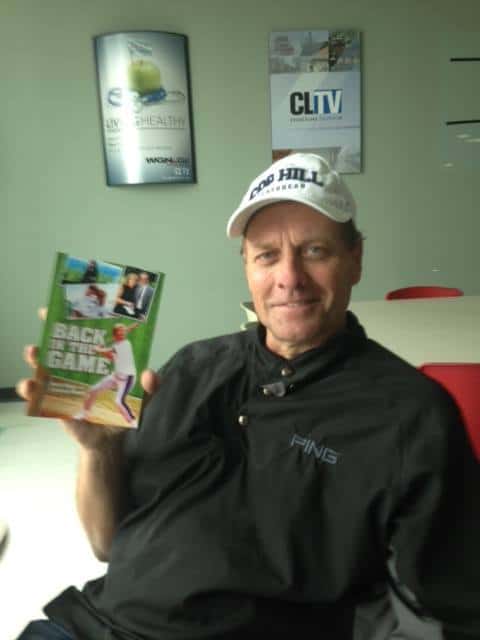
Jerry Reinsdorf was branded as a cheap, money-pinching owner when his team payrolls showed the opposite. There were mistakes along the way—the Hawk Harrelson experiment, letting LaRussa get away. He angered some of his own friends when he threatened to move the White Sox to Tampa, but if the threat had not been made nothing would have been done to build a new ballpark. Staying in crumbling old Comiskey Park was not an option. If the team hadn’t moved to Tampa, the team would have fled to another city later or stayed in Chicago as a doormat. Now, we were aboard a World Series victory parade bus—Jerry’s plan had ultimately worked out. “Like Harry Truman,” we joked.
Jerry’s record speaks for itself—six Bulls titles, a World Series win, two new sports facilities and a record of philanthropy that has won his organizations numerous awards. All that is on the record; what he has done behind the scenes for individuals will remain undocumented by his choice.
It has to be pointed out that Jerry also grew up in baseball’s Golden Age, in Brooklyn of all places. The nostalgic grandeur of baseball resides not in Cooperstown but in Brooklyn, in the ghosts of the old Ebbets Field. He grew up dreaming of heroes like Jackie Robinson and Pee Wee Reese. Baseball is in Jerry’s blood; one of his biggest thrills in life was when LaRussa got him an invitation to dinner with Stan Musial and Red Schoendienst.
“Can you imagine?” he told me.
Because I knew the man and had worked alongside him, I never understood the perception that he only cared about the money. Seeing him in awe, almost childlike, talking about Stan Musial and other legends of the game, I understood his veneration and respect and how it translated to the work for his own team. I could fully understand what this day of celebration meant to him: just about everything.
Jerry saw six titles with the Chicago Bulls and played a role in the greatest, most significant sports dynasty in the city’s history. He was elated after each, for sure. There was no doubt that winning brought him joy. But it was the World Series ring that made him weep. It was the title with the White Sox that moved him to tears. Anyone who saw him that night in the locker room, at the parade, or at any of the festivities that surrounded the title knew how much he cared about this team.
With a victory in hand, Jerry could enjoy hugging his granddaughter amid a sea of admirers as the bus rolled through the downtown streets. Bill Veeck was there in spirit, too, through the team and his wife, Mary Frances, donning a World Series ring.
When I returned to WGN that evening, I walked through the doorway to a shower of applause, an unexpectedly wonderful ending to the most perfect day. I got a hero’s welcome for my job on the coverage; such praise lasts for about twenty-four hours in our business. Then, you move on to the next story.
Back at the office, I immediately returned to the grind and began putting my package together for the nine o’clock show. I wanted to bring the viewer into the moment, put the fans on the bus alongside their favorite players and coaches, and I was successful because of my amazing team. I was spoiled for material. Mike D’Angelo took the most breathtaking crowd shots—a joyous sea of black and white, ticker tape everywhere, deafening roars, generations of Chicagoans all celebrating together. I did not use a single word of voice-over copy for that show. The footage spoke for itself. There was no need to say anything, just the crowd noise and interviews for two minutes, the messy joy of it all without interruption.
The day after the White Sox won the World Series, John Landecker called his old producer (and future co-author) Rick Kaempfer and asked him to write something for him to celebrate the moment. Rick is a Cubs fan, and you can probably see a little bit of that in the focus of his poem, but clearly he is giving his kudos to the White Sox. John Landecker read this piece on WLS-AM radio that morning…
The outlook wasn’t brilliant for the White Sox nine that day,
The Angels led one game to none, game two was slipping away,
And then when AJ got strike two, and missed strike three the same,
A pall-like silence fell upon all the Sox fans at the game,
The Angels catcher tossed Pierzynski’s ball out to the mound,
But AJ turned and ran to first, with outrage all around,
The umpire calmly stood his ground, achieving instant fame,
And AJ somehow found a brand new way to win a game,
The White Sox never lost again, and shining stars were born,
Each time Joe Crede came to bat the other team would mourn,
And he and Juan Uribe were magicians with their gloves,
And Paul Konerko was the home run hero we all love,
When Ozzie came out to the mound, he motioned round and fat,
And Bobby Jenks showed the Astros why he wanted that,
And little Scott Podsednik hit the home run in Game 2,
And the White Sox starting pitching was like a dream come true,
In Game 3’s fourteenth inning the Astros fans were glum,
Beaten by a former Astro named Geoff Blum,
And Jermaine Dye had a shining moment in game four,
When he knocked in the winning run, the White Sox shut the door.
And though each game was close and tight, the White Sox never feared,
Ever since A.J.’s run to first, they knew this was their year,
And now the catcher catches the ball, and now he lets it go,
and now the air is shattered by the AJ we all owe,
Oh, somewhere in this country, some fans are screaming foul,
But White Sox fans say let them scream, let them cry and growl,
Cause White Sox fans are laughing, and White Sox fans can shout,
The south side is rejoicing,
Pierzynski has struck out.
A real-life Grimm Fairy Tale
In 8 days, we’ll make sure this story has a happy ending. pic.twitter.com/XAA3sLzqbo
— The Lincoln Project (@ProjectLincoln) October 26, 2020
RIP Ron Britain
Talk about the day you quit WJMK.
 Ron: Oh boy. Well, about a year before I quit WJMK, I went up to Harvey Pearlman, the GM, and asked for more money because they had taken a big promotional job away from me, and I needed to make that up somehow. Harvey said, "If you can find somebody else to pay you that kind of money, by all means, take it."
Ron: Oh boy. Well, about a year before I quit WJMK, I went up to Harvey Pearlman, the GM, and asked for more money because they had taken a big promotional job away from me, and I needed to make that up somehow. Harvey said, "If you can find somebody else to pay you that kind of money, by all means, take it."He didn't think I would, and it took me a year to do it, but I did. Nobody knew I was leaving except for John Patton at WTMX. I wanted to get the word out, so I decided to do it live on the air. The plan was to record the last part of the show saying where I was going on the dial, and then hopping in a limo, and finishing the show on the other radio station—which was WTMX.
The only wrinkle was that Harvey Pearlman, who usually left at 4:00 in the afternoon, was still there at 5:30. I decided to turn the microphone on while I played the recorded bit, and then if he stormed into the studio and started swearing and trying to hit me over the head with his vodka bottle, it would all go on the air.
He didn't go in there, but I did go over to WTMX. Unfortunately, it turned out to be the wrong station for me. I should have gone to a station that was playing the same kind of music. The music wasn't quite right for my fans that had been with me all those years.
Rick: Harvey never forgave you for that. I remember a WJMK Christmas party...my first one there, it must have been 1993 or so. You showed up to make amends with him, and he had to be physically restrained from going after you. Do you remember that night?
Ron: (Laughs out loud, long, and hard) Yeah, I remember that. I'm a manic depressive and I was in a manic moment, and I just wanted to say Happy Holidays to Harvey. So I hopped in a cab, and well...you saw it. You know, I always liked him in a Don Rickles sort of way, and I know he liked me, and that's probably why he was so upset by that move. But he told me to take it if I got that money from someone else...


